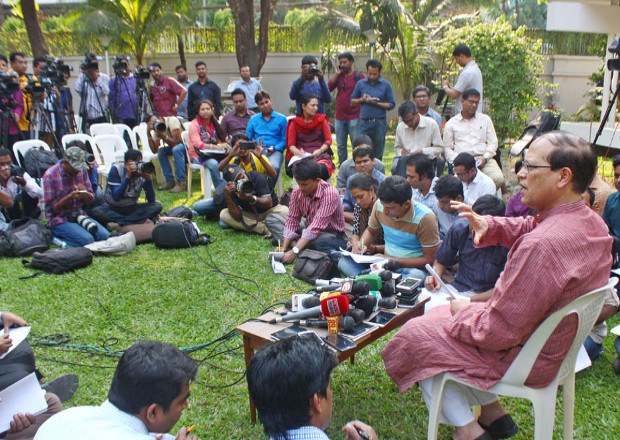Bangladesh Central Bank Head Quits in Post-Heist Shake-Up
2016.03.15
Dhaka
 Former Bangladesh central bank Gov. Atiur Rahman speaks to reporters at his home in Dhaka following his resignation, March 15, 2016.
Former Bangladesh central bank Gov. Atiur Rahman speaks to reporters at his home in Dhaka following his resignation, March 15, 2016.
Bangladesh’s central bank governor resigned Tuesday and two of his deputies were sacked in a shake-up over the cyber-theft of U.S. $81 million from one of the bank’s overseas accounts.
Atiur Rahman, who served as governor of the Bangladesh Bank (BB) for seven years, resigned during a meeting with Prime Minister Sheikh Hasina. In accepting his resignation, she assured him that the government would investigate the “probable involvement” of other central bank officials in the Feb. 4 heist, her press secretary told BenarNews.
"In the context of the situation arising out of the 'undesired incident' at the Bangladesh Bank, the governor today tendered his resignation to the honorable Prime Minister," Press Secretary Ihsanul Karim said, alluding to the largest bank robbery in Bangladesh’s history.
The thieves tried to steal around U.S. $1 billion of BB money held in an account at the Federal Reserve Bank of New York, but a typo in a payment order destined for Sri Lanka led to their more ambitious plot unraveling, Bangladeshi officials confirmed last week.
"The honorable prime minister has said Dr. Rahman’s resignation demonstrates his moral courage and honesty," Karim added.
Two of Rahman’s four deputies, Nazin Sultana and Abul Kashem, were removed from their positions as part of a post-robbery shuffle at the central bank, Finance Minister Abul Maal Abdul Muhith told reporters later.
Bank officials had failed to notify him promptly about the robbery, Muhith said earlier this week. He said he only learned about the theft from reading a report in a Philippine newspaper, the People's Daily Inquirer, which broke the story on Feb. 29. A portion of the money that was stolen was wired from the Federal Reserve Bank of New York to a bank in Manila.
Bangladeshi central bank officials went public about the theft on March 8.
On Tuesday, Muhith announced that former Finance Secretary Fazle Kabir would succeed Rahman as the bank’s governor.
In addition, Jamaludin Ahmed, the general secretary of the Bangladesh Economic Association, and Rushidan Islam Rahman, research director at the Bangladesh Institute of Development Studies (BIDS), were being appointed to replace Sultana and Kashem on the bank’s 10-member board of directors, Muhith said.
‘There were some delays’: Rahman
The finance minister met with Rahman at Muhith’s home in Dhaka on Monday night, after the bank governor had returned to the Bangladeshi capital from a trip to New Delhi.
"The finance minister suggested that it would be better if I resigned," Rahman told reporters at his official residence on Tuesday morning, after handing his resignation to the prime minister.
In responding to questions about why the bank was slow to notify the minister about the missing money, Rahman said the BB “could not understand the theft” immediately and it was also trying to get the stolen money back.
"We informed the government when the situation was under control and we saw the possibility of getting the money back. So, there were some delays,” Rahman told reporters.
An expensive typo
The $81 million that was stolen on Feb. 4 (New York time) was among five tranches totaling U.S. $101 million that were wired from the bank’s account in New York to a Manila branch of the Rizal Commercial Banking Corporation (RCBC) and the Central Bank of Sri Lanka, some BB officials told BenarNews last week on condition of anonymity.
The New York Fed processed five payment orders placed by hackers who used a confidential code for money transfers known only to a handful of officials at the Bangladesh Bank, Mohammed Farashuddin, a former BB governor who is leading the investigation into the theft, told BenarNews.
Last week, he suggested in an interview with Benar that “collusion” must have taken place between the hackers and someone at the bank.
The thieves tried to transfer another $950 million out of the account in New York via 30 other tranches, but those transactions were blocked because of the misspelling of the word “foundation” in a payment order that was made out to a Sri Lankan NGO, the anonymous sources said.
This discrepancy raised the suspicion of officials at Sri Lanka’s central bank, who alerted both the New York Fed and Bangladesh Bank, which then blocked the subsequent payment orders.
The New York Fed said it was assisting Bangladesh’s central bank in its investigation into the theft.
“The payment instructions in question were fully authenticated by the SWIFT messaging system in accordance with standard authentication protocols,” a New York Fed spokesperson said last week, adding there was no evidence that “Fed systems were compromised.”
The Sri Lankan central bank had now returned $20 million to the Bangladesh Bank account in New York, Abu Hena Md Razi Hasan, a deputy governor at the BB, told reporters Sunday.
A portion of the $81 million that was wired to the Philippines – $30 million – wound up being delivered in cash to an individual in Manila, Reuters reported on Tuesday, citing testimony given to Philippine lawmakers.
The rest of the money went to two casinos in the Philippines, where anti-money laundering officials have frozen 44 bank accounts connected to the case, according to Reuters.







